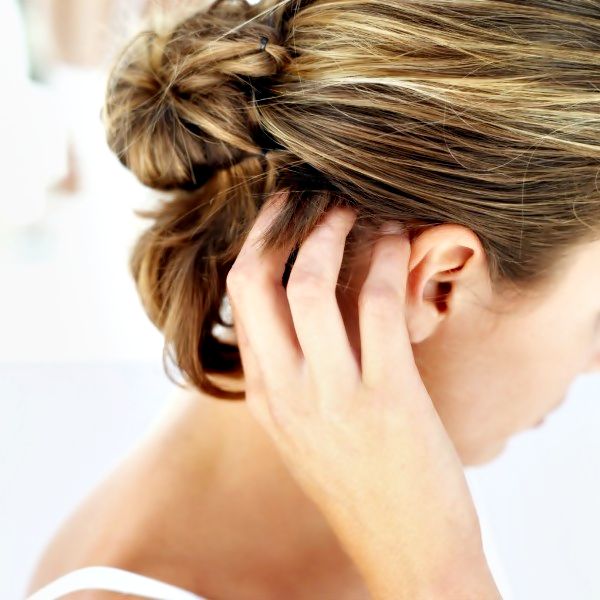
Itchy scalp is a common problem of the scalp that regularly affects 15 to 20 percent of the world’s population and is mainly considered as a disease. The problems of scalp arise due to a fungus which normally lives on the scalp without tissue, but which can grow out of control and feed on the oil secreted by the hair follicles. Apart from the irritation, an itchy scalp can cause several other problems too. For some people, the condition might be even embarrassing. A common cause of itchy scalp for adults is dandruff. It’s a symptom of numerous scalp disorders, including scalp fungus, psoriasis etc. In this article, we shall discuss about the causes of these conditions and their treatments.
- Dandruff
Dandruff are the dead skin of scalp that sheds off in an abnormal way. Excessivesebum production by the cells of the scalp, exposure to extreme temperatures,or sometimes some fungi occurs naturally on the scalp which are the triggeringfactors for dandruff. Medicated shampoos having the principal ingredients ofketoconazole, selenium, zinc pyrithione, salicylic acid can be effective indandruff.
2. Seborrheicdermatitis
It is also a common condition for itchiness in the scalp. Although the symptoms of seborrheic dermatitis are quite similar to dandruff,the cause is totally different. A fungus triggers the disease along with thereaction of environmental, genetic, and hypo immune states. Deficiency ofVitamin B complex also plays a role in seborrheic dermatitis. Medicated shampoos comprising zinc pyrithione, selenium, salicylates, and terbinafine isused for treatment.
3. Sunburn
UV rays in sunlight produces dead cells by burning the superficial cells of the scalp. These dead cells can lead to itchy scalp. Theitchiness increases if there is an excess sweat production. The best way totreat sunburn is to avoid sunlight. Covering your head with a cap or usingsun-protective lotions will keep away the harmful effects of sunrays.
4. Psoriasis
Psoriasis is a perennial disease of the skin. The patient suffers from itchiness due tothe scaly patches on the skin. Scalp psoriasis can lead to itchy scalp. No onecan say the cause of Psoriasis, it remains controversial. Medications whichdirectly target the specific immune component are the mainstay of treatment ofpsoriasis. Use of drugs and antibodies such as infliximab, alefacept,etanercept, and adalimumab are effective in psoriasis.
5. Pediculosis
In the condition of pediculosis, itchy scalp condition rises due to head louse.These are parasites which feed on animal blood and bite the skin of the scalpto worsen the itchiness. The best way to demonstrate a live louse is to combthe hair properly with a louse-comb. Pediculosis can easily be treated bythorough combing and with medicated shampoos. Salicylates and seleniumcontaining shampoo is the best way to treat the condition. Repeated treatmentwith the shampoo is necessary to get rid of the lice.
6. Tinea capitis
Hair is destroyed in the condition where a fungus known as dermatophyte infects theshaft of the hair. Eventually a significant area of the scalp hair is infectedby the fungus. Scaly flakes can come out from the scalp like dandruff.Application of antifungal drugs like gresiofulvin, ketoconazole, and itraconazoleis effective in the treatment. Terbinafine, an antifungal medicine is proven tobe an important and effective drug in the treatment of tinea capitis.
7. Sensitivity to hair care products
You can get an itchy scalp if you are allergic toward any hair care products. It isalways important to test the products whether haircare or bodycare before usingit by applying it in the back of your ears. This would help if you are allergicto any products and hence you should not use the product further. Symptomatic treatmentis used for this condition.
8. Acne vulgaris
Acne is also an itchy scalp condition. Inflammatory condition develops due toblockage in the passage of the sebaceous gland by dead cells and bacteria. Foracne, usually the general medicines are enough for the treatment. Anti allergicdrugs can also be used to get relief from the itchy scalp.
9. Folliculitis of the scalp
The scalp develops itchiness due to the infection of the scalp tissue withbacteria. The condition can easily spread from your scalp to the other bodypart of the body. Folliculitis of the scalp can be treated by anti-allergicmedicines and antibiotics.
10. Poor personal hygiene
Last, but not the least is poor personal hygiene. Keeping your hair clean andmaintaining your personal hygiene would keep away dirt particles and infectivematerials from the scalp. Poor personal hygiene can lead to allergic reactionsand many problems of dermatitis, therefore, the result could be an itchy scalp. Regular hair cleansing with a good shampoo is the treatment and cure to thiscondition.


